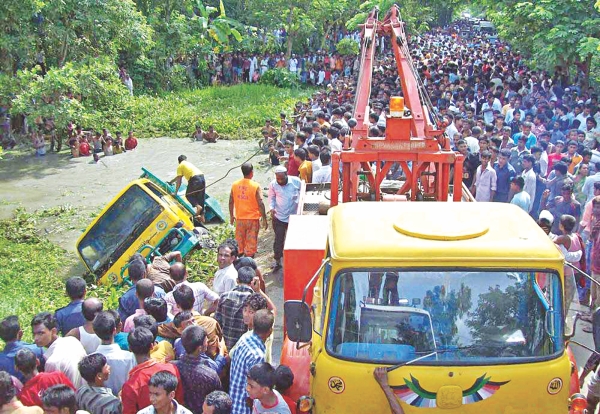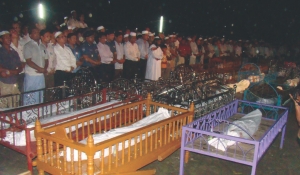| Home - Back Issues - The Team - Contact Us |
 |
| Volume 10 |Issue 28 | July 22, 2011 | |
|
|
Reflection
Is this Tragedy Mohammad Ali Sattar It was a farmer driving the truck. The truck carried the tender souls. The playful children were returning home after a hectic day. All were elated. Seldom are they blessed with opportunities of outing: watching football and then a joy ride! A day to cherish! Far away, little did the waiting parents in the poor hamlet of Mirsarai know that it was doomsday for them. Little did they know that a devastating tsunami would sweep through their lives devouring their priceless treasure! The farmer who was driving the ill-fated truck was definitely enjoying the sojourn, for he was not allowed to take long routes by his owner. Today was the day! He was pumped up carrying the jubilant children back home. He must have been keen to show his skills as a finished driver. He must have tried to impress upon his hapless passengers. While driving, he was talking over his mobile phone. And no one knows what really went awry that saw the truck take a plunge into the roadside tank. The giant carrier took along with it the precious lives for the final dip. All but a few choked to death.
Highway accidents are a frequent event. Nearly 70 percent of the road accidents in Bangladesh happen on the highways. By now a 'blind' man has learnt to see the accidents that wait to happen and a deaf can loudly hear the wails of the near ones who lose their dear ones. We have talked about the reasons of these accidents more than a million times. It's simple arithmetic. The established reasons are, reckless driving by untrained drivers, dilapidated conditions of the vehicles, complete lack of road sense, total disregard for traffic rules and most notably the indifferent attitude of the patrol police. Authorities are well accustomed to these mishaps. They know the reasons better than anybody. And by now they have learnt the art of denying the responsibility. After each mishap, either there is a committee formed by the government or there is an inquiry team set up by the law enforcing agencies to look into the cause of the incidents. Nothing happens. For long 40 years nothing happened to the culprits. However strong may be the 'law', weak handling by immoral people render them ineffective . Conditions are even more dangerous in rural areas. Authorities do not have any effective control over the drivers. Most of them are without any formal training and do not possess a valid paper to drive. In rural areas you don't have driving training centres. Many of them come from entirely different backgrounds and professions. A bullock cart driver or a rickshaw-van puller becomes a driver by training with truck or bus drivers. And they wait for their chance to hit the road. When they do they are seldom experienced. No wonder that they handle the vehicles with limitations galore. Lack of road sense is another reason of these road mishaps. The speed limit is not at all cared for. Dangerous turning points are usually not properly marked and the user also does not bother to figure out any signs that may give direction to the speed limit or turns. Most dangerous are the jay walkers. The villagers simply do not care about the speeding vehicle. They mostly make wrong calculations about the approaching vehicle and get killed under the wheels. Who is going to infuse the necessary road sense in them? And most of the vehicles that ply these routes have long been out dated. You come across a bus or a truck or smaller versions of those, with no original parts in it. Their grotesque look tells it all. They run the risk of turning turtle anytime, yet they are pressed into service for business. Cops don't do much about it. BRTA has no role to play here! How can we only blame the driver in case of accidents? It could be anything; from a faulty vehicle, to jaywalking, to faulty road configuration. We do not know if the Bangladesh Road Transport Authority (BRTA) has any mechanism to assert its authority in those regions. It's time BRTA came up with an effective plan to stop these drivers from getting behind the wheels. The plan ought to cover the entire country. We are forced to say, that BRTA has been a failure in the cities, what it shall do outside, remains to be seen. Highly controversial activities of the BRTA also need to be addressed. The role of the law enforcers is also dubious. We seldom find patrol police on the highways. Whatever little force is available they are seldom in sight. And traffic outposts are also absent. Practically, the entire route through the districts and rural areas are without police vigil. Therefore, adventure by the drivers is but a natural practice. At times, even if the cops are available they are unable to check the rash and reckless driving of the truant drivers. Most of the cases of default are negotiated between the culprits and the law enforcers. Several important factors, therefore, are involved in making roads safe and journeys safer. It has to be a collective effort on part of the communications ministry, BRTA, police, vehicle owners and the members of the public. Comprehensive national awareness programme along with strict enforcement of law are two important measures that ought to be taken up immediately to stop the tragedies that happen almost everyday in every nook and cranny of the country. If the Mirsarai tragedy fails to move us, what else will? The writer is Assistant Editor, The Daily Star. Copyright
(R) thedailystar.net 2011 |

